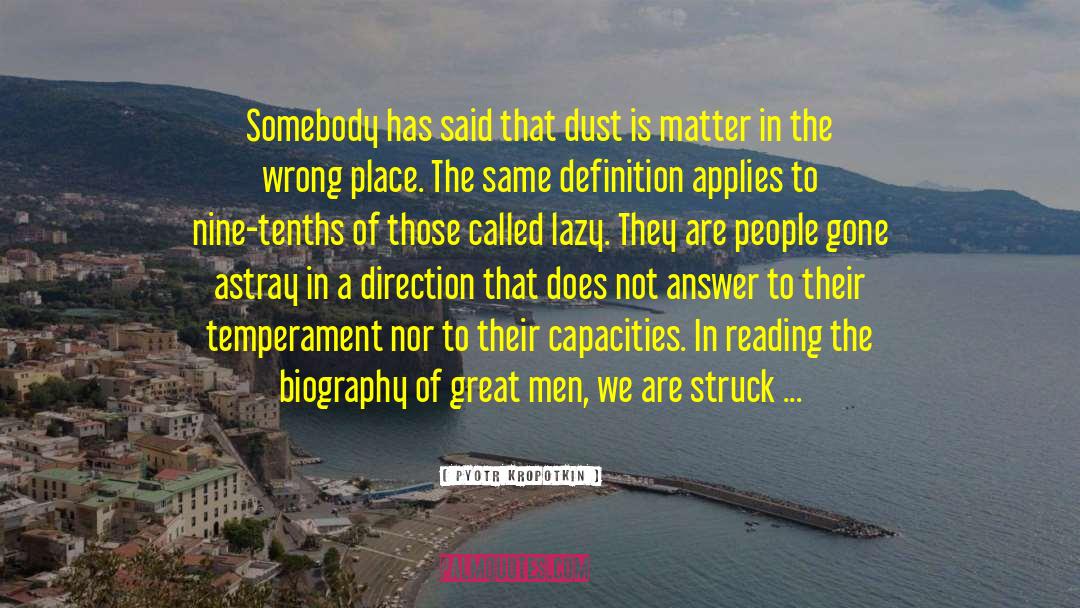Pyotr Kropotkin Famous Quotes
Reading Pyotr Kropotkin quotes, download and share images of famous quotes by Pyotr Kropotkin. Righ click to see or save pictures of Pyotr Kropotkin quotes that you can use as your wallpaper for free.
Sometimes he would advise me to read poetry, and would send me in his letters quantities of verses and whole poems, which he wrote from memory. 'Read poetry,' he wrote: 'poetry makes men better.' How often, in my later life, I realized the truth of this remark of his! Read poetry: it makes men better.

Man is not a being whose exclusive purpose in life is eating, drinking, and providing a shelter for himself. As soon as his material wants are satisfied, other needs, which, generally speaking, may be described as of an artistic character, will thrust themselves forward. These needs are of the greatest variety; they vary with each and every individual; and the more society is civilized, the more will individuality be developed, and the more will desires be varied.
Even today we see men and women denying themselves necessaries to acquire mere trifles, to obtain some particular gratification, or some intellectual or material enjoyment. A Christian or an ascetic may disapprove of these desires for luxury; but it is precisely these trifles that break the monotony of existence and make it agreeable. Would life, with all its inevitable drudge and sorrows, be worth living, if, besides daily work, man could never obtain a single pleasure according to his individual tastes?
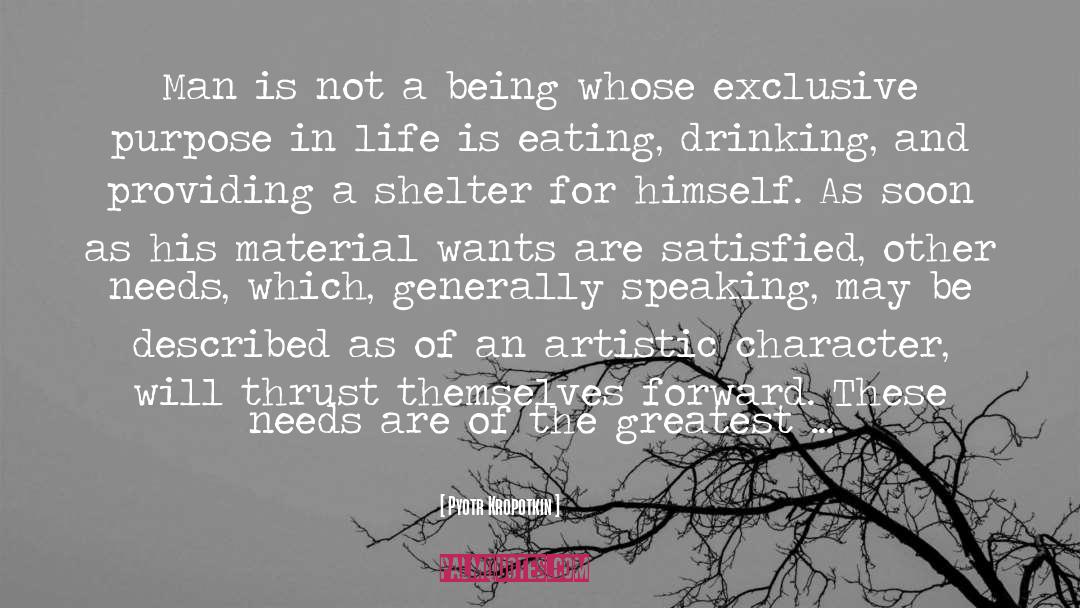
And while English workmen are often unemployed and in great want, Indian women weave cotton by machinery, for the Far East at wages of six-pence a day. In short, the intelligent manufacturers are fully aware that the day is not far off when they will not know what to do with the "factory hands" who formerly wove cotton-cloth for export from England.
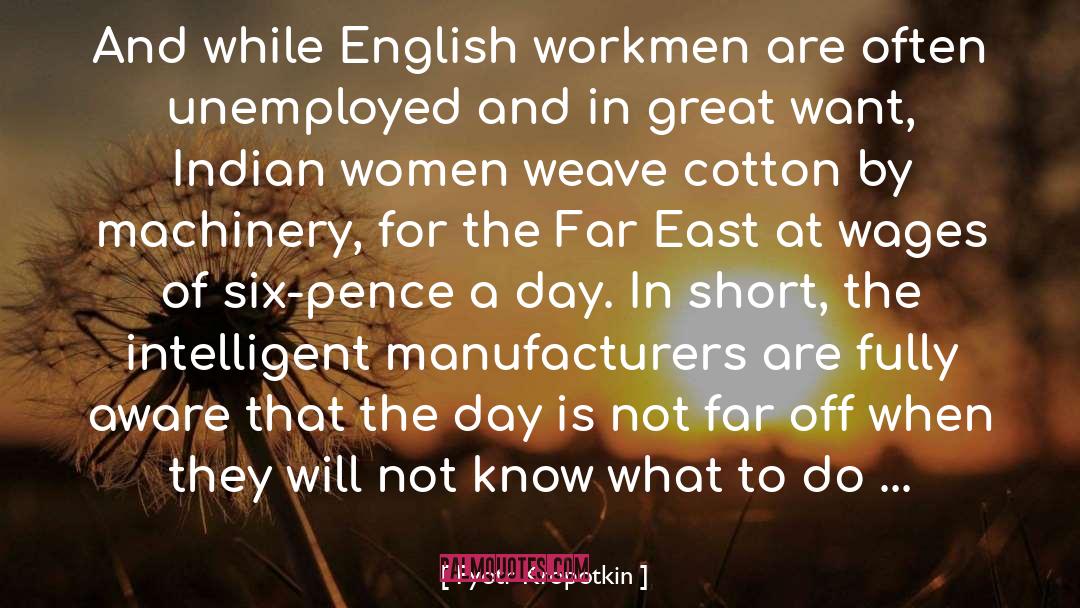
Of course the no-government ethics will meet with at least as many objections as the no-capital economics. Our minds have been so nurtured in prejudices as to the providential functions of government that anarchist ideas must be received with distrust. Our whole education, from childhood to the grave, nurtures the belief in the necessity of a government and its beneficial effects. Systems of philosophy have been elaborated to support this view; history has been written from this standpoint; theories of law have been circulated and taught for the same purpose. All politics are based on the same principle, each politician saying to people he wants to support him: "Give me the governmental power; I will, I can, relieve you from the hardships of your present life." All our education is permeated with the same teachings. We may open any book of sociology, history, law, or ethics: everywhere we find government, its organisation, its deeds, playing so prominent a part that we grow accustomed to suppose that the State and the political men are everything; that there is nothing behind the big statesmen. The same teachings are daily repeated in the Press. Whole columns are filled up with minutest records of parliamentary debates, of movements of political persons. And, while reading these columns, we too often forget that besides those few men whose importance has been so swollen up as to overshadow humanity, there is an immense body of men - mankind, in fact - growing and dying, livin

No, plenty for all is not a dream – though it was a dream indeed in those days when man, for all his pains, could hardly win a few bushels of wheat from an acre of land, and had to fashion by hand all the implements he used in agriculture and industry. Now it is no longer a dream, because man has invented a motor which, with a little iron and a few sacks of coal, gives him the mastery of a creature strong and docile as a horse, and capable of setting the most complicated machinery in motion.
But, if plenty for all is to become a reality, this immense capital – cities, houses, pastures, arable lands, factories, highways, education – must cease to be regarded as private property, for the monopolist to dispose of at his pleasure.
This rich endowment, painfully won, builded, fashioned, or invented by our ancestors, must become common property, so that the collective interests of men may gain from it the greatest good for all.
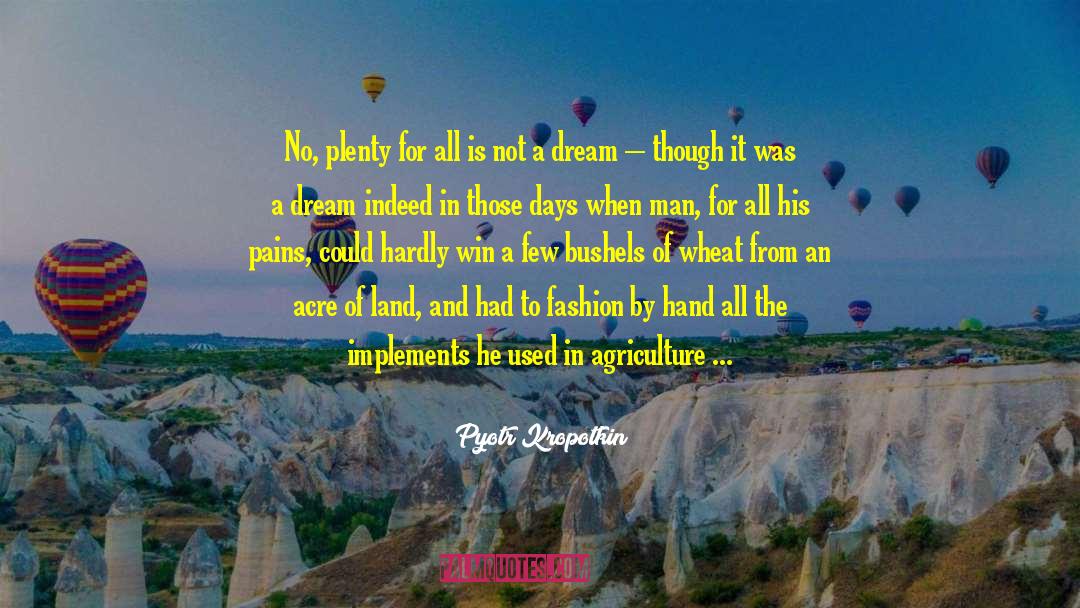
All that was once looked on as a function of the government is today called in question. Things are arranged more easily and more satisfactorily without the intervention of the state. And in studying the progress made in this direction, we are led to conclude that the tendency of the human race is to reduce government interference to zero; in fact, to abolish the state, the personification of injustice, oppression and monopoly.
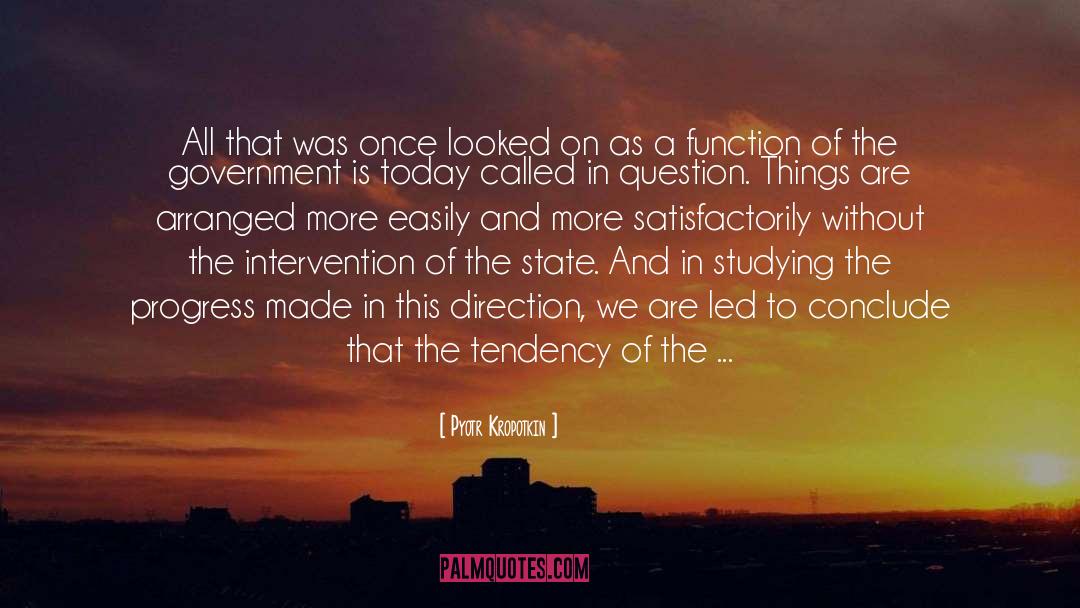
Because, to do manual work now, means in reality to shut yourself up for ten or twelve hours a day in an unhealthy workshop, and to remain chained to the same task for twenty or thirty years, and maybe for your whole life.
It means to be doomed to a paltry wage, to the uncertainty of the morrow, to want of work, often to destitution, more often than not to death in a hospital, after having worked forty years to feed, clothe, amuse, and instruct others than yourself and your children.
It means to bear the stamp of inferiority all your life; because, whatever the politicians tell us, the manual worker is always considered inferior to the brain worker, and the one who has toiled ten hours in a workshop has not the time, and still less the means, to give himself the high delights of science and art, nor even to prepare himself to appreciate them; he must be content with the crumbs from the table of privileged persons.
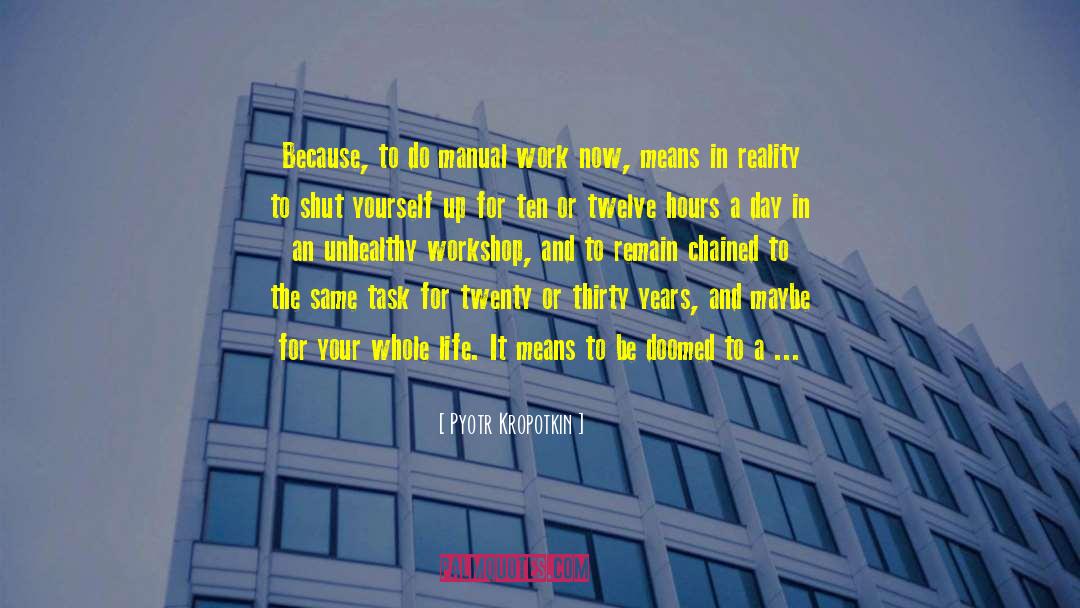
Should an authoritarian Socialist society ever succeed in establishing itself, it could not last; general discontent would soon force it to break up, or to reorganize itself on principles of liberty.

This is the secret of wealth; find the starving and destitute, pay them half a crown, and make them produce five shillings worth in the day, amass a fortune by these means, and then increase it by some lucky hit, made with the help of the State.
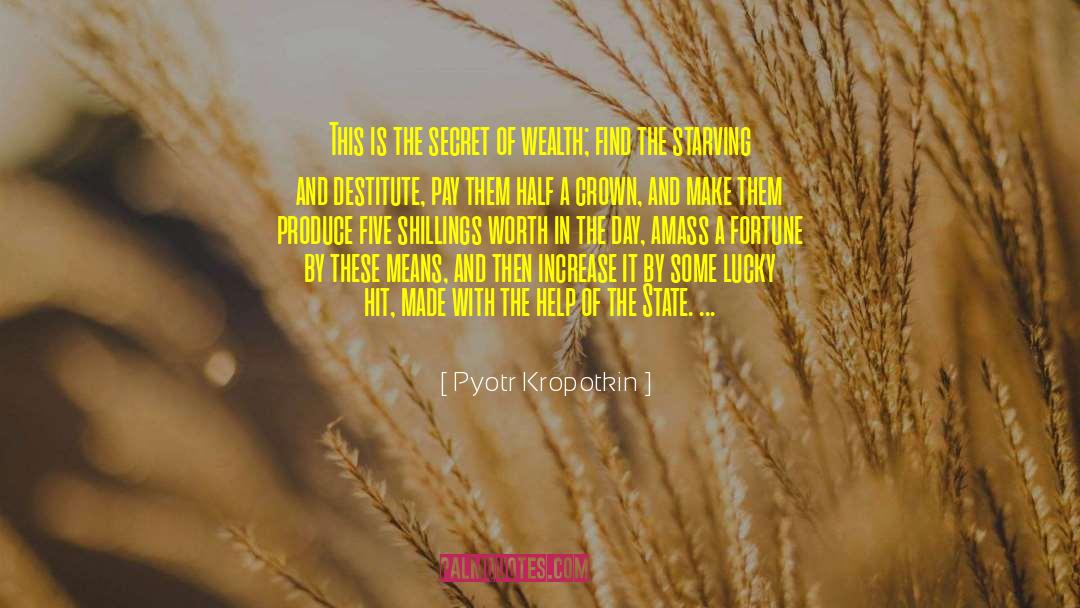
Men passionately desire to live after death, but they often pass away without noticing the fact that the memory of a really good person always lives. It is impressed upon the next generation, and is transmitted again to the children. Is that not an immortality worth striving for?
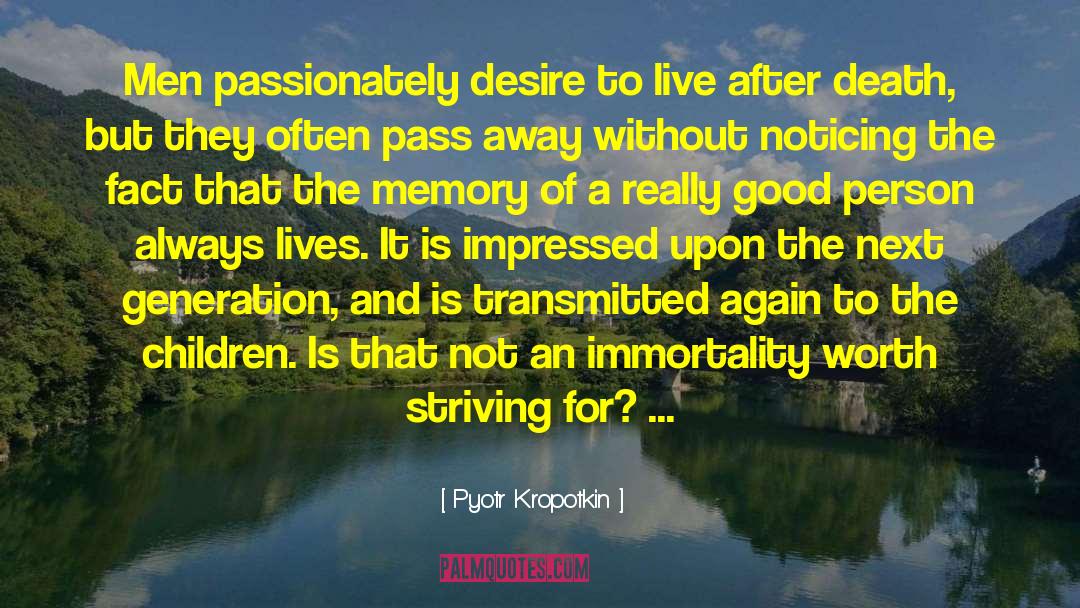
The truth, however, is that – to speak only of what I know personally – if I had kept a diary for the last twenty-four years and inscribed in it all the devotion and self-sacrifice which I came across in the Socialist movement, the reader of such a diary would have had the word "heroism" constantly on his lips. But the men I would have spoken of were not heroes; they were average men, inspired by a grand idea. Every Socialist newspaper – and there are hundreds of them in Europe alone – has the same history of years of sacrifice without any hope of reward, and, in the overwhelming majority of cases, even without any personal ambition.
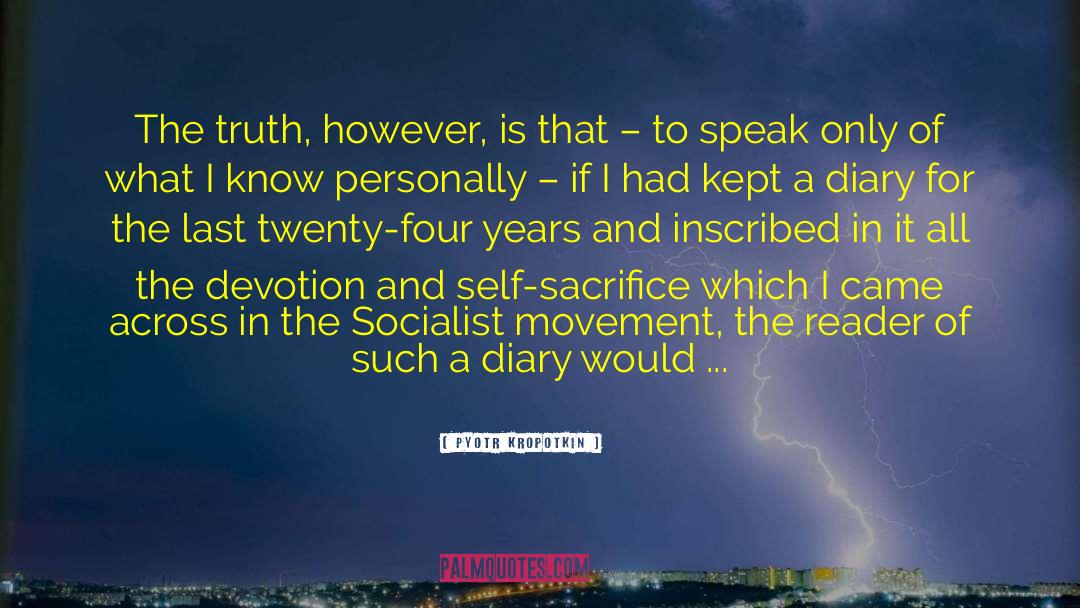
Multiply examples, choose them where you will, consider the origin of all fortunes, large or small, whether arising out of commerce, finance, manufactures or the land. Everywhere you will find that the wealth of the wealthy springs from the poverty of the poor. This is why an anarchist society need not fear the advent of a Rothschild who would settle in its midst. If every member of the community knows that after a few hours of productive toil he will have a right to all the pleasures that civilization procures, and to those deeper sources of enjoyment which art and science offer to all who seek them, he will not sell his strength for a starvation wage.
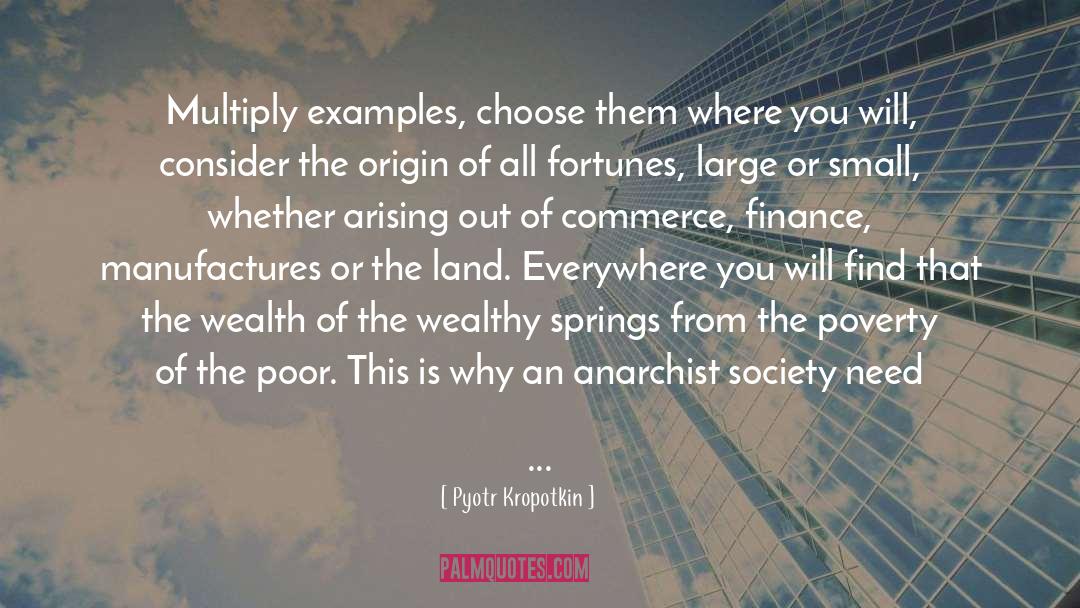
The idea of good and evil has thus nothing to do with religion or a mystic conscience. It is a natural need of animal races. And when founders of religions, philosophers, and moralists tell us of divine or metaphysical entities, they are only recasting what each ant, each sparrow practices in its little society. Is this useful to society? Then it is good. Is this hurtful? Then it is bad.

In short, the five or seven hours a day which each will have at his disposal, after having consecrated several hours to the production of necessities, would amply suffice to satisfy all longings for luxury, however varied. Thousands of associations would undertake to supply them. What is now the privilege of an insignificant minority would be accessible to all. Luxury, ceasing to be a foolish and ostentatious display of the bourgeois class, would become an artistic pleasure.
Everyone would be the happier for it. In collective work, performed with a light heart to attain a desired end, a book, a work of art, or an object of luxury, each will find an incentive and the necessary relaxation that makes life pleasant.
In working to put an end to the division between master and slave, we work for the happiness of both, for the happiness of humanity.
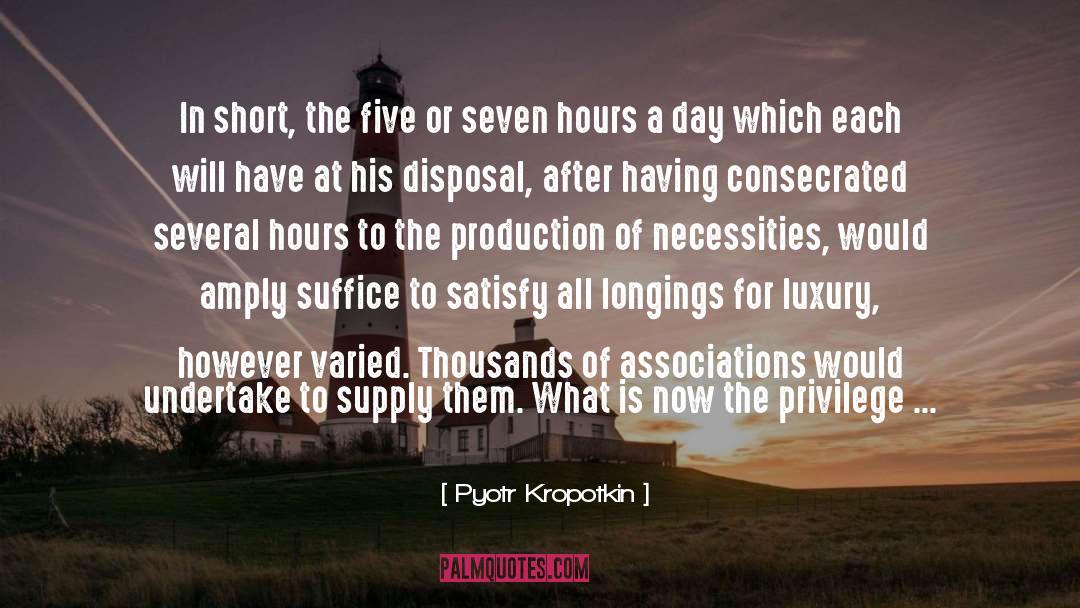
It is not difficult, indeed, to see the absurdity of naming a few men and saying to them, "Make laws regulating all our spheres of activity, although not one of you knows anything about them!
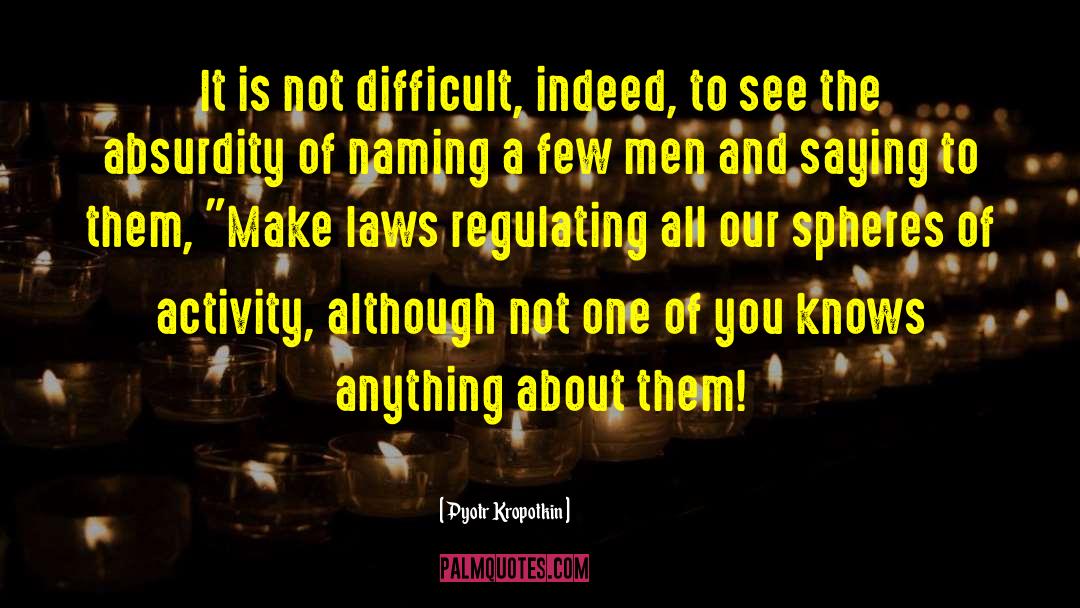
Be strong. Overflow with emotional and intellectual energy, and you will spread your intelligence, your love, your energy of action broadcast among others! This is what all moral teaching comes to.

Prisons are universities of crime, maintained by the state.

The feeling of solidarity is the leading characteristic of all animals living in society. The eagle devours the sparrow, the wolf devours the marmot. But the eagles and the wolves respectively aid each other in hunting, the sparrow and the marmot unite among themselves against the beasts and birds of prey so effectually that only the very clumsy ones are caught. In all animal societies solidarity is a natural law of far greater importance than that struggle for existence, the virtue of which is sung by the ruling classes in every strain that may best serve to stultify us.

To seek pleasure, to avoid pain, is the general line of action (some would say law) of the organic world. Without this quest of the agreeable, life itself would be impossible. Organisms would disintegrate, life cease. Thus whatever a man's actions and line of conduct may be, he does what he does in obedience to a craving of his nature. The most repulsive actions, no less than actions which are indifferent or most attractive, are all equally dictated by a need of the individual who performs them. Let him act as he may, the individual acts as he does because he finds a pleasure in it, or avoids, or thinks he avoids, a pain. Here we have a well-established fact. Here we have the essence of what has been called the egoistic theory.
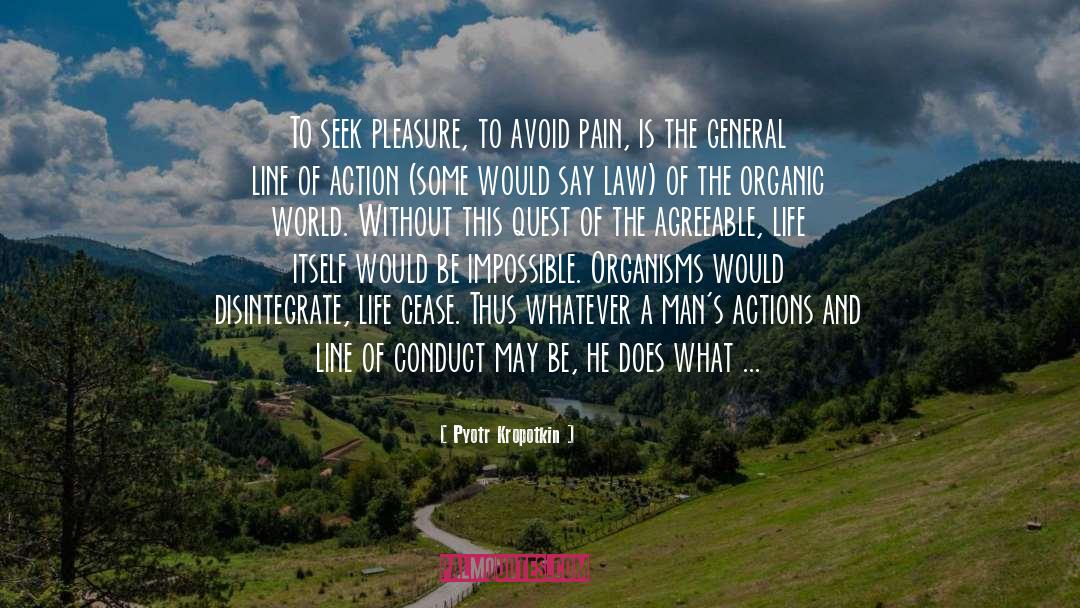
Thus by an unprejudiced observation of the animal kingdom, we reach the conclusion that wherever society exists at all, this principle may be found: Treat others as you would like them to treat you under similar circumstances. And when we study closely the evolution of the animal world, we discover that the aforesaid principle, translated by the one word Solidarity, has played an infinitely larger part in the development of the animal kingdom than all the adaptations that have resulted from a struggle between individuals to acquire personal advantages.
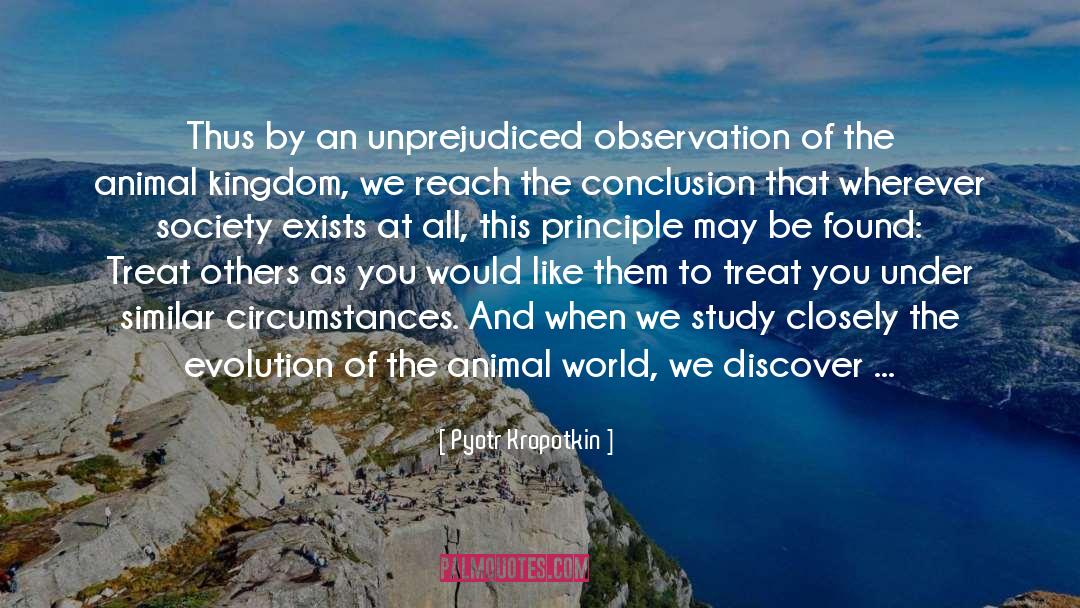
Lenin is not comparable to any revolutionary figure in history. Revolutionaries have had ideals. Lenin has none.
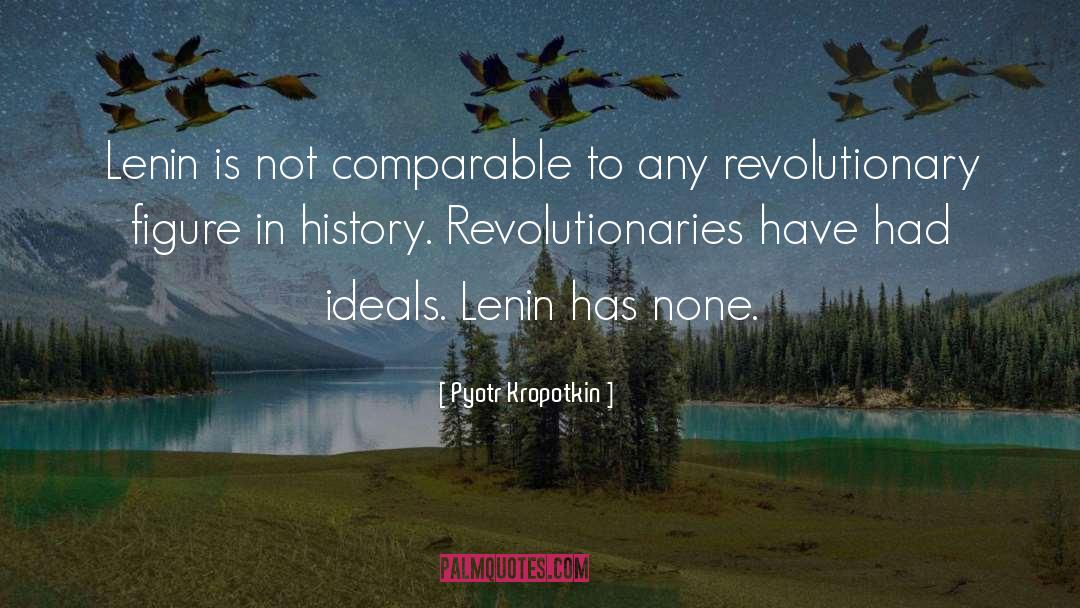
In our civilized societies we are rich. Why then are the many poor? Why this painful drudgery for the masses? Why, even to the best paid workman, this uncertainty for the morrow, in the midst of all the wealth inherited from the past, and in spite of the powerful means of production, which could ensure comfort to all, in return for a few hours of daily toil?
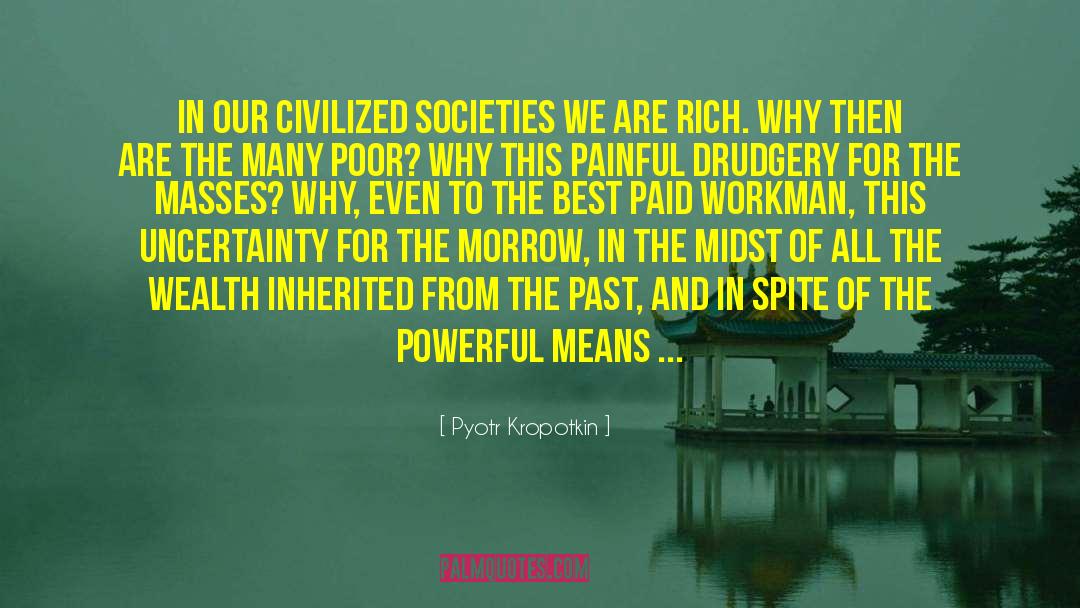
The anarchists cannot consider, like the collectivists, that a remuneration which would be proportionate to the hours of labour spent by each person in the production of riches may be an ideal, or even an approach to an ideal, society. Without entering here into a discussion as to how far the exchange value of each merchandise is really measured now by the amount of labour necessary for its production - a separate study must be devoted to the subject - we must say that the collectivist ideal seems to us merely unrealizable in a society which has been brought to consider the necessaries for production as a common property. Such a society would be compelled to abandon the wage-system altogether. It appears impossible that the mitigated individualism of the collectivist school could co-exist with the partial communism implied by holding land and machinery in common - unless imposed by a powerful government, much more powerful than all those of our own times. The present wage-system has grown up from the appropriation of the necessaries for production by the few; it was a necessary condition for the growth of the present capitalist production; and it cannot outlive it, even if an attempt be made to pay to the worker the full value of his produce, and hours-of-labour-checks be substituted for money. Common possession of the necessaries for production implies the common enjoyment of the fruits of the common production; and we consider that an equitable organization of society can o
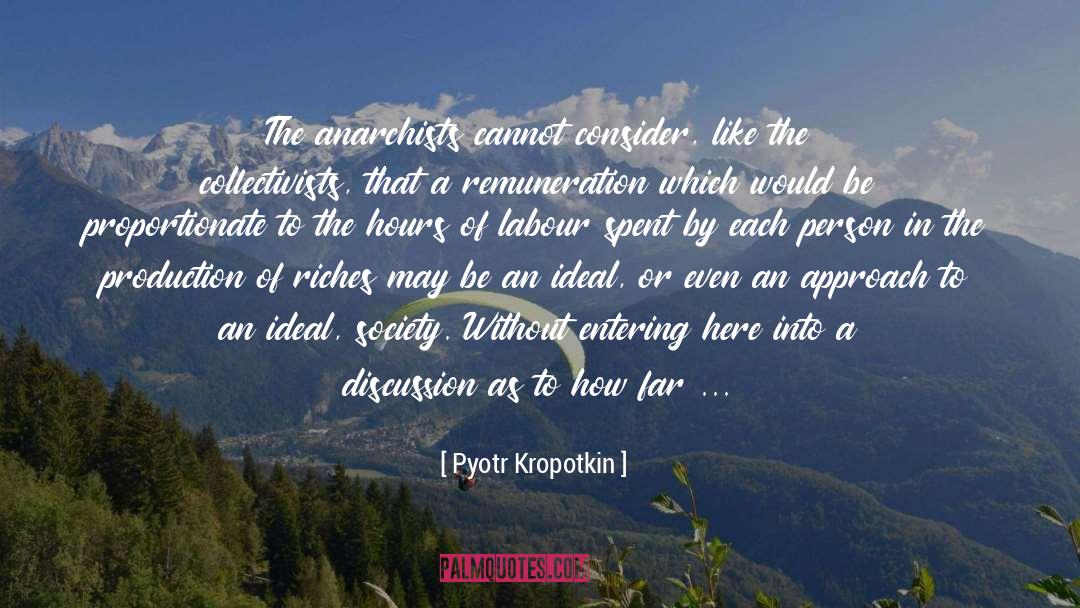
Struggle! To struggle is to live, and the fiercer the struggle the intenser the life. Then you will have lived; and a few hours of such life are worth years spent vegetating.
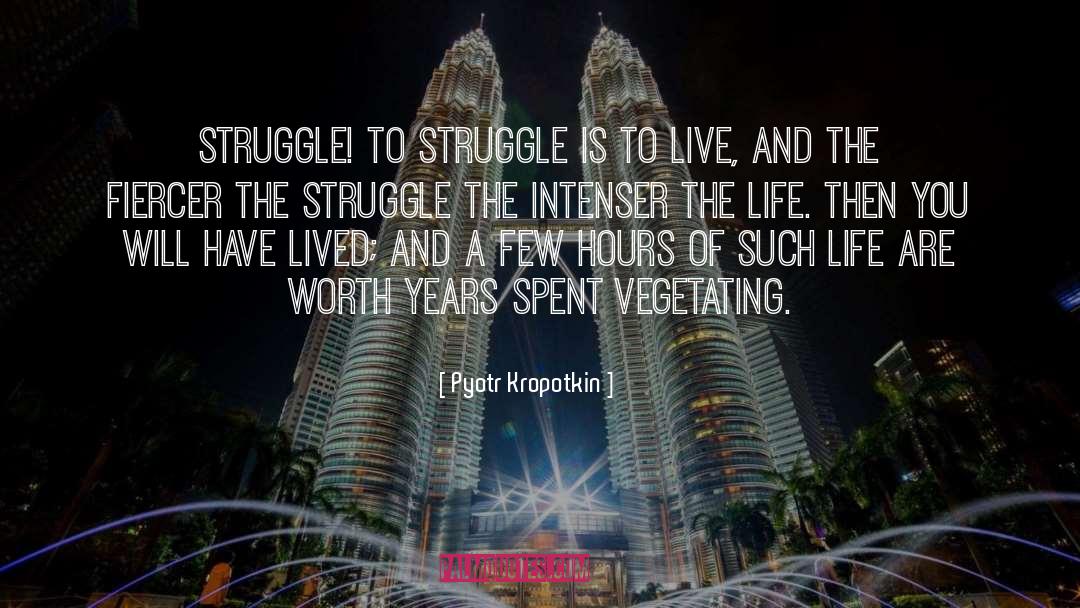
They fear that without compulsion the masses will not work. But during our own lifetime, have we not heard the same fears expressed twice? Once, by the anti-abolitionists in America before the emancipation of the Negroes, and, for a second time, by the Russian nobility before the liberation of the serfs? 'Without the whip the Negro will not work,' said the anti- abolitionist. 'Free from their master's supervision the serfs will leave the fields uncultivated,' said the Russian serf-owners. It was the refrain of the French noblemen in 1789, the refrain of the Middle Ages, a refrain as old as the world, and we shall hear it every time there is a question of sweeping away an injustice. And each time actual facts give it the lie. The liberated peasant of 1792 ploughed with an eager energy, unknown to his ancestor so, the emancipated Negro works more than his fathers; and the Russian peasant, after having honoured the honeymoon of his emancipation by celebrating Fridays as well as Sundays, has taken up work with an eagerness proportionate to the completeness of his liberation. There, where the soil is his, he works desperately; that is the exact word for it. The anti-abolitionist refrain can be of value to slave-owners; as to the slaves them- selves, they know what it is worth, as they know its motive.
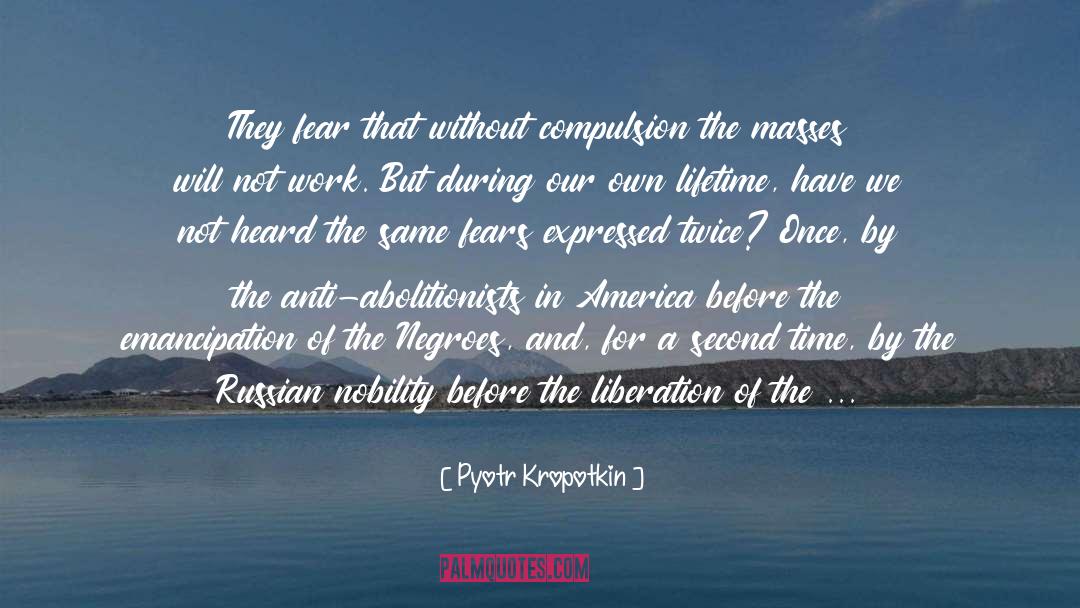
One more impression I gathered from that work of my boyhood, an impression which I did not formulate till afterward, and which will probably astonish many a reader. It is the spirit of equality which is highly developed in the Russian peasant, and in fact in the rural population everywhere. The Russian peasant is capable of much servile obedience to the landlord and the police officer; he will bend before their will in a servile manner; but he does not consider them superior men, and if the next moment that same landlord or officer talks to the same peasant about hay or ducks, the latter will reply to him as an equal to an equal. I never saw in a Russian peasant that servility, grown to be a second nature, with which a small functionary talks to one of high rank, or a valet to his master. The peasant too easily submits to force, but he does not worship it.
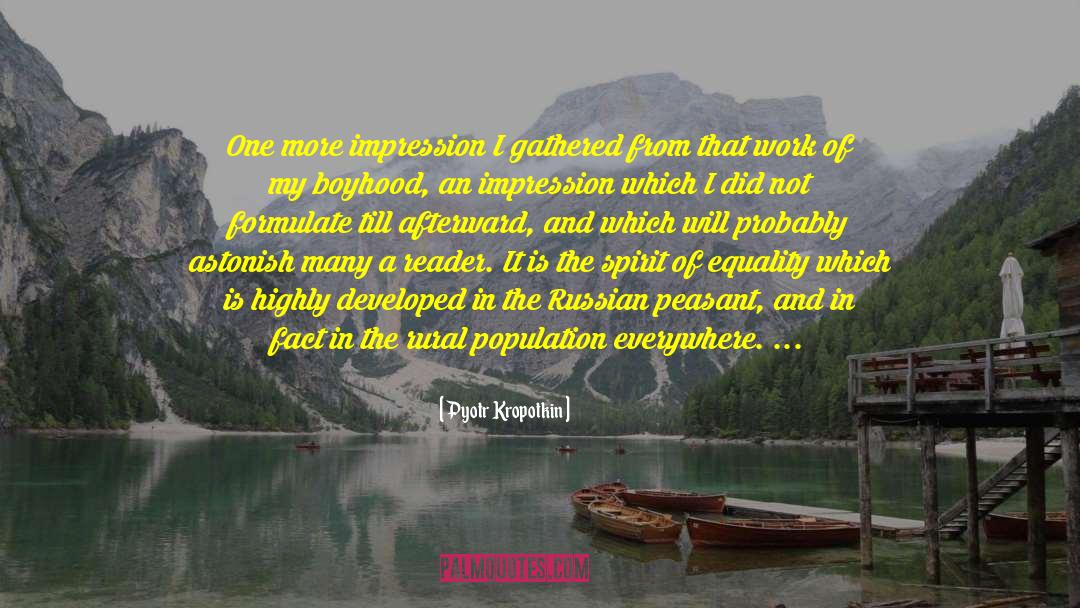
What interest, in fact, can this depressing work have for the worker, when he knows that the fate awaiting him from the cradle to the grave will be to live in mediocrity, poverty, and insecurity of the morrow? Therefore, when we see the immense majority of men take up their wretched task every morning, we feel surprised at their perseverance, at their zeal for work, at the habit that enables them, like machines blindly obeying an impetus given, to lead this life of misery without hope for the morrow; without foreseeing ever so vaguely that some day they, or at least their children, will be part of a humanity rich in all the treasures of a bountiful nature, in all the enjoyments of knowledge, scientific and artistic creation, reserved to-day to a few privileged favourites.
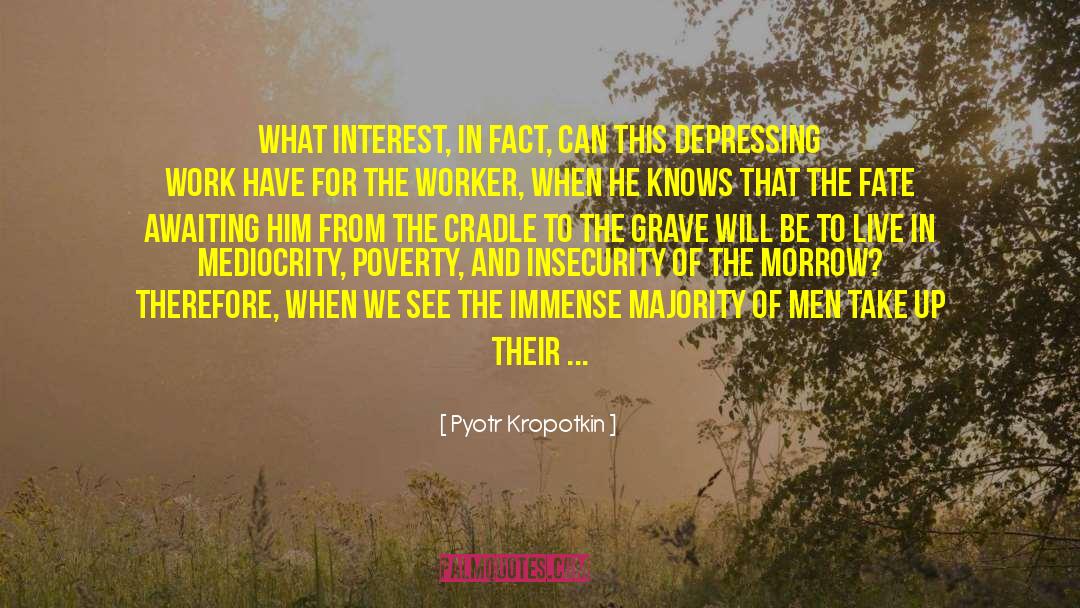
Accustomed as we are by heredity prejudices and our unsound education and training to represent ourselves the beneficial hand of Government, legislation and magistracy everywhere, we have come to believe that man would tear his fellow-man to pieces like a wild beast the day the police took his eye off him; that absolute chaos would come about if authority were overthrown during a revolution. And with our eyes shut we pass by thousands and thousands of human groupings which form themselves freely, without any intervention of the law, and attain results infinitely superior to those achieved under governmental tutelage.
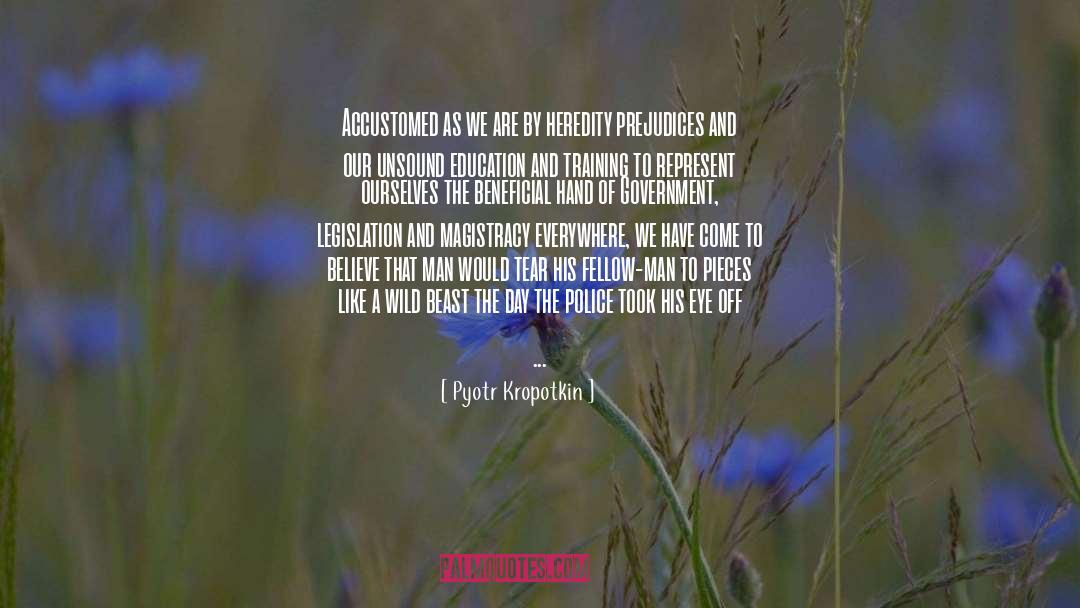
We must recognize, and loudly proclaim, that every one, whatever his grade in the old society, whether strong or weak, capable or incapable, has, before everything, THE RIGHT TO LIVE, and that society is bound to share amongst all, without exception, the means of existence it has at its disposal.

Throughout the history of our civilisation, two traditions, two opposed tendencies, have been in conflict: the Roman tradition and the popular tradition, the imperial tradition and the federalist tradition, the authoritarian tradition and the libertarian tradition.
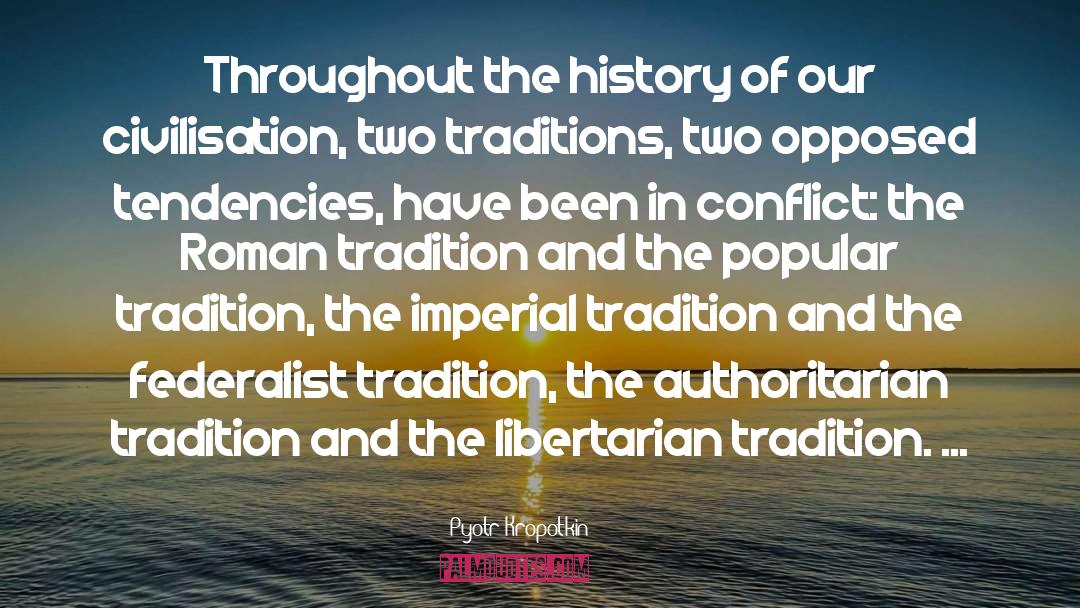
My brother could not write about trifles. Even in society he became animated only when some serious discussion was engaged in, and he complained of feeling 'a dull pain in the brain'
a physical pain, as he used to say
when he was with people who cared only for small talk.
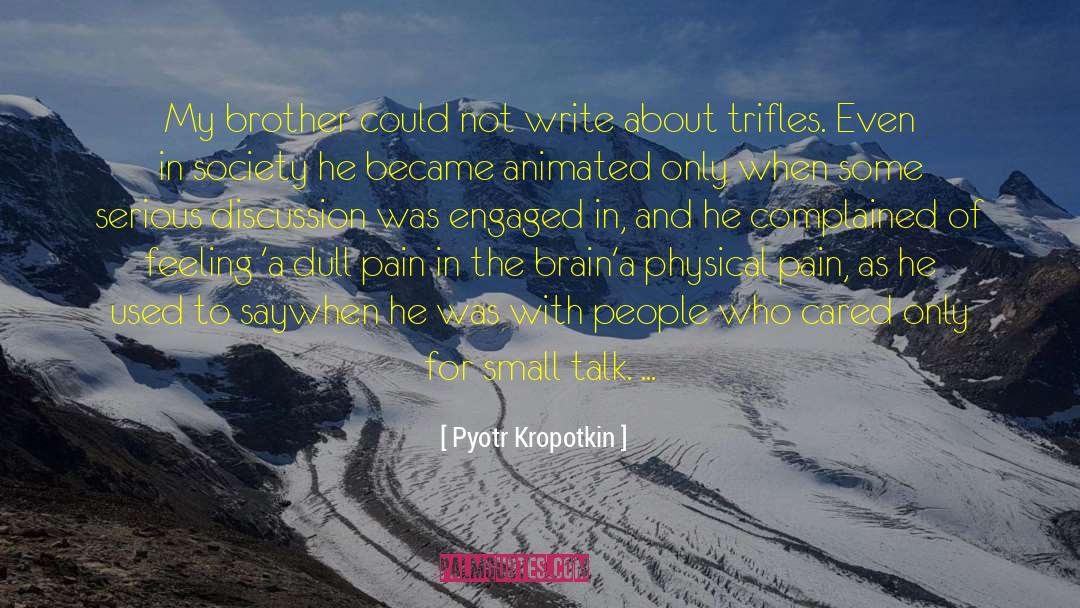
To emancipate woman, is not only to open the gates of the university, the law courts, or the parliaments to her, for the "emancipated" woman will always throw her domestic toil on to another woman. To emancipate woman is to free her from the brutalizing toil of kitchen and washhouse; it is to organize your household in such a way as to enable her to rear her children, if she be so minded, while still retaining sufficient leisure to take her share of social life. It will come. As we have said, things are already improving. Only let us fully understand that a revolution, intoxicated with the beautiful words, Liberty, Equality, Solidarity, would not be a revolution if it maintained slavery at home. Half humanity subjected to the slavery of the hearth would still have to rebel against the other half.

The species in which peace and mutual support are the rule, prosper, while the unsociable species decay.

Built up by the middle classes to hold their own against royalty, sanctioning, and, at the same time strengthening, their sway over the workers, parliamentary rule is pre-eminently a middle-class rule. The upholders of this system have never seriously maintained that a parliament or a municipal council represent a nation or a city. The most intelligent among them know that this is impossible. The middle classes have simply used the parliamentary system to raise a protecting barrier against the pretensions of royalty, without giving the people liberty. But gradually, as the people become conscious of their real interests, and the variety of their interests is growing, the system can no longer work. Therefore democrats of all countries vainly imagine various palliatives. The Referendum is tried and found to be a failure; proportional representation is spoken of, the representation of minorities, and other parliamentary Utopias. In a word, they strive to find what is not to be found, and after each new experiment they are bound to recognize that it was a failure; so that confidence in Representative Government vanishes more and more.
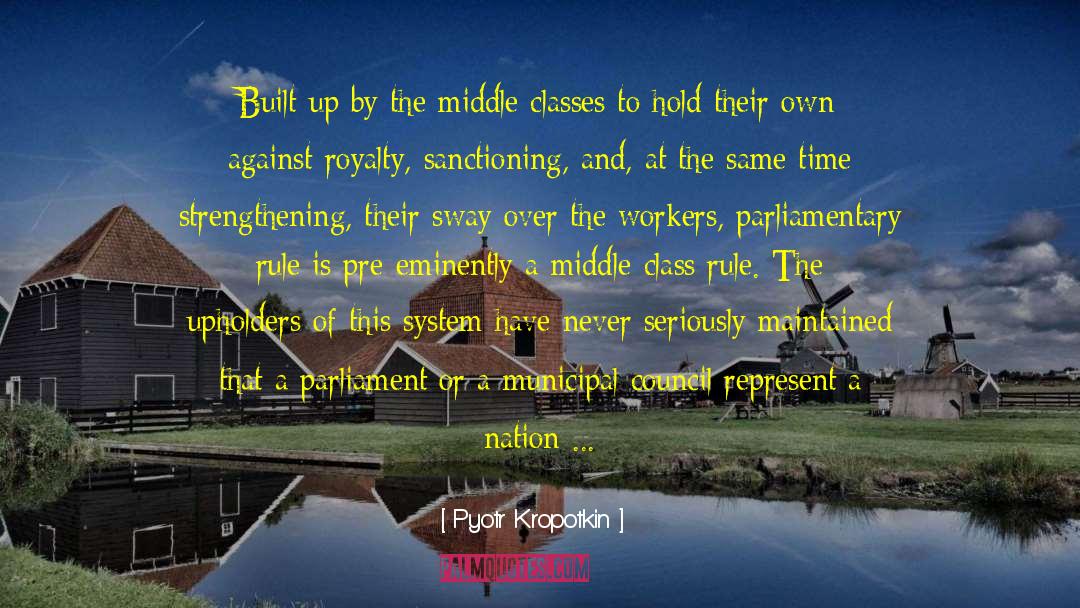
variety is life; uniformity is death
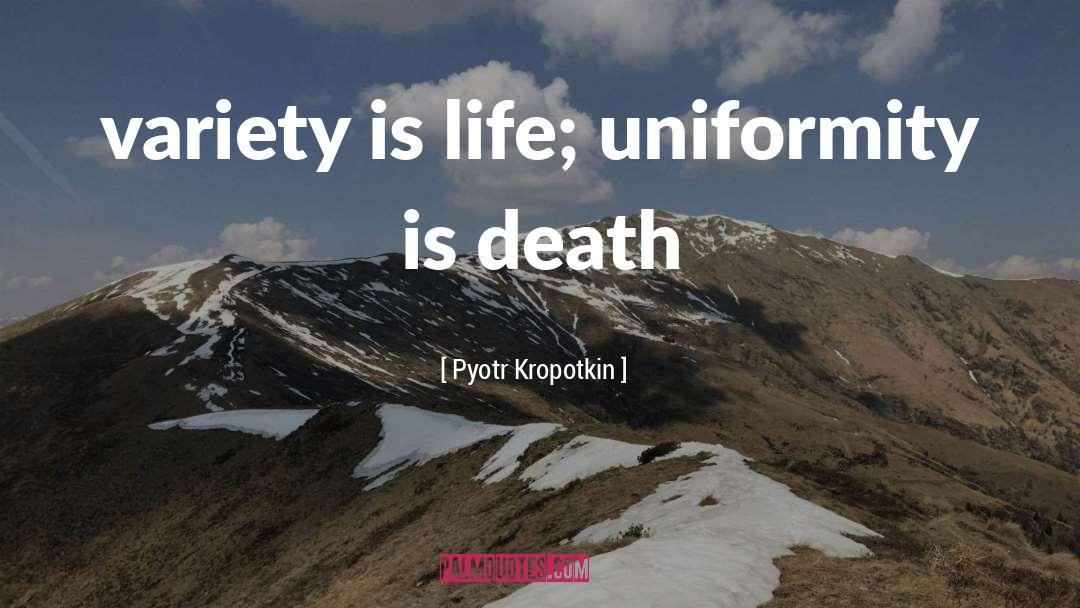
Every machine has had the same history – a long record of sleepless nights and of poverty, of disillusions and of joys, of partial improvements discovered by several generations of nameless workers, who have added to the original invention these little nothings, without which the most fertile idea would remain fruitless. More than that: every new invention is a synthesis, the resultant of innumerable inventions which have preceded it in the vast field of mechanics and industry.
Science and industry, knowledge and application, discovery and practical realization leading to new discoveries, cunning of brain and of hand, toil of mind and muscle – all work together. Each discovery, each advance, each increase in the sum of human riches, owes its being to the physical and mental travail of the past and the present.
By what right then can anyone whatever appropriate the least morsel of this immense whole and say – This is mine, not yours?
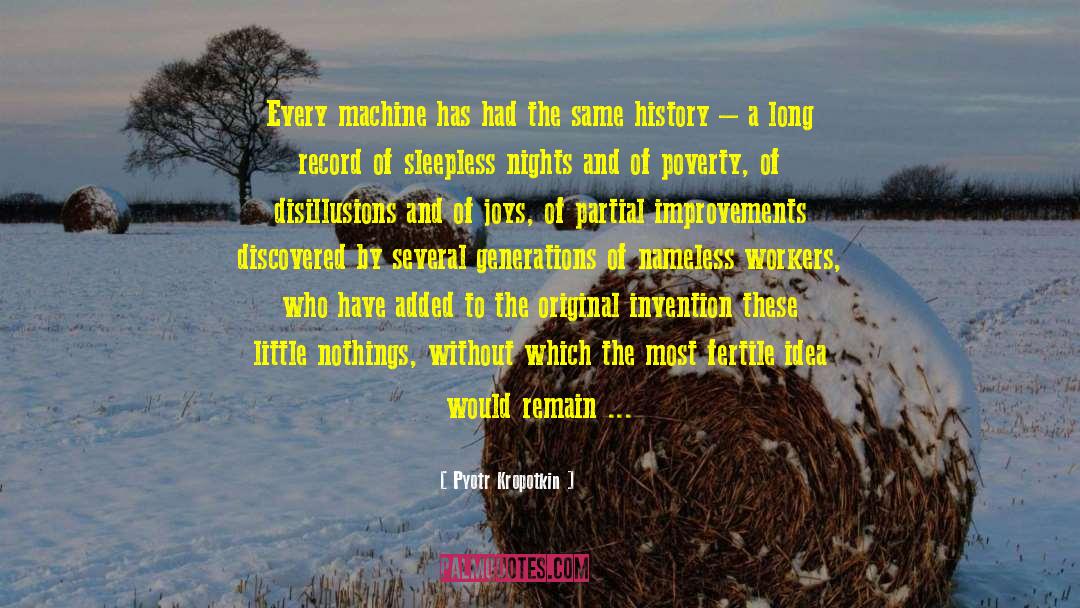
He objected, though, to indiscriminate reading. 'One must have some question,' he wrote, 'addressed to the book one is going to read.
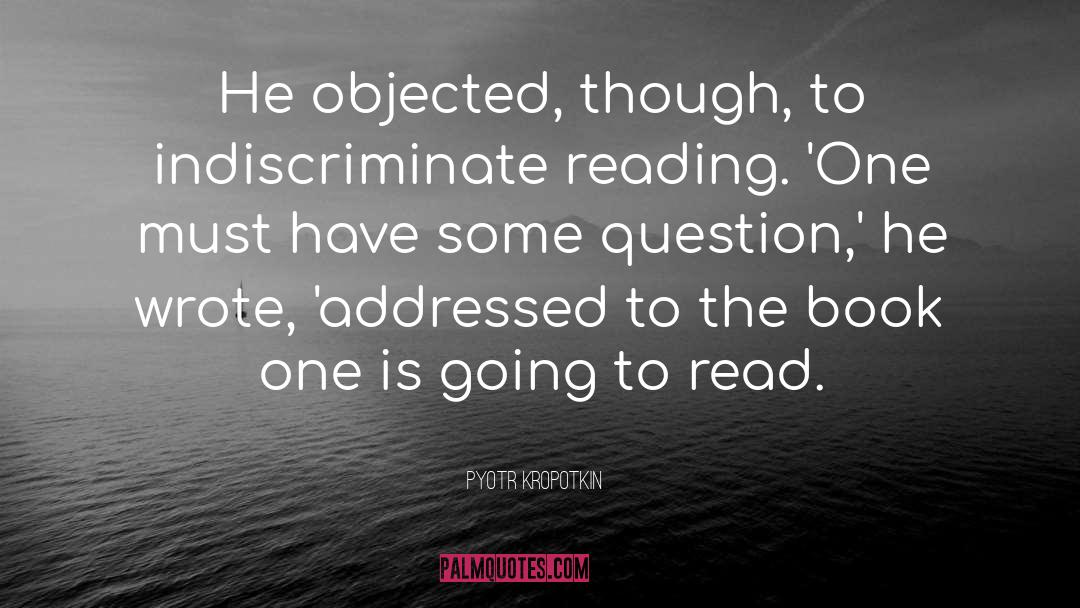
When one has talent, everything contributes to its development.
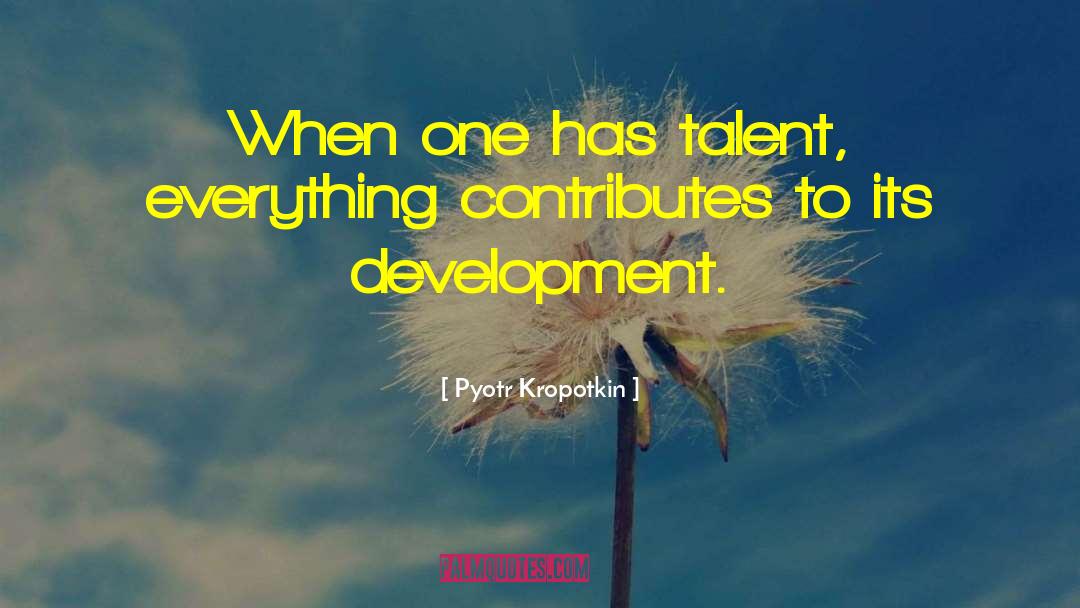
The concurrence of two elements is necessary for bringing about a revolution; and by revolution I do not mean the street warfare, nor the bloody conflicts of two parties - both being mere incidents dependent upon many circumstances - but the sudden overthrow of institutions which are the outgrowths of centuries past, the sudden uprising of new ideas and new conceptions, and the attempt to reform all political and economical institutions in a radical way - all at the same time. Two separate currents must converge to come to that result: a widely spread economic revolt, tending to change the economical conditions of the masses, and a political revolt, tending to modify the very essence of the political organisation - an economical change, supported by an equally important change of political institutions.
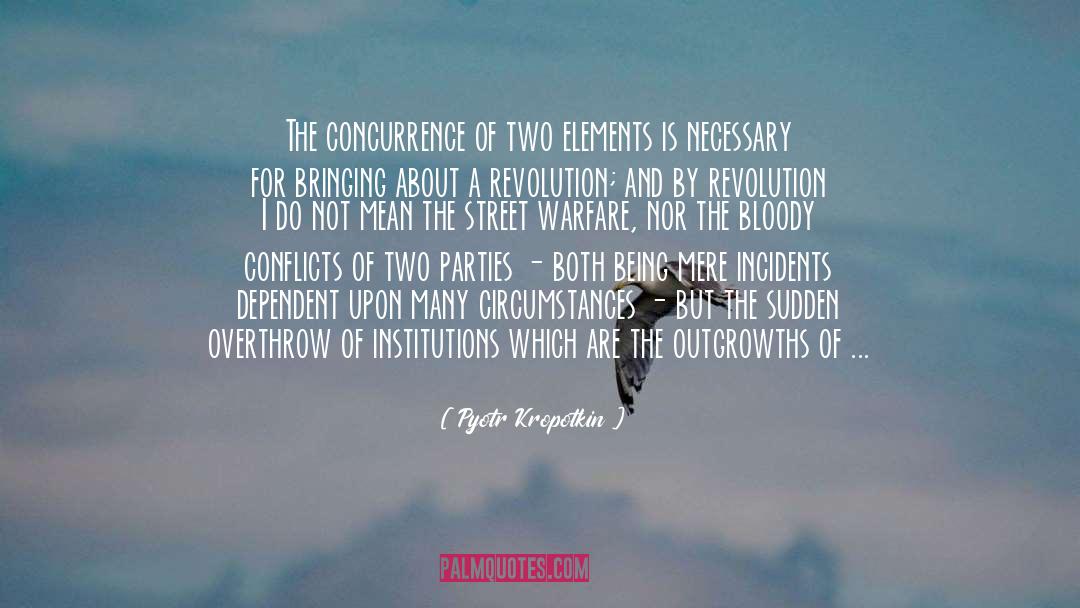
Finally, our studies of the preparatory stages of all revolutions bring us to the conclusion that not a single revolution has originated in parliaments or in any other representative assembly. All began with the people. And no revolution has appeared in full armor--born, like Minerva out of the head of Jupiter, in a day. They all had their periods of incubation, during which the masses were very slowly becoming imbued with the revolutionary spirit, grew bolder, commenced to hope, and step by step emerged from their former indifference and resignation. And the awakening of the revolutionary spirit always took place in such a manner that, at first, single individuals, deeply moved by the existing state of things, protested against it, one by one. Many perished--"uselessly," the arm-chair critic would say; but the indifference of society was shaken by these progenitors. The dullest and most narrow-minded people were compelled to reflect,--Why should men, young, sincere, and full of strength, sacrifice their lives in this way? It was impossible to remain indifferent--it was necessary to take a stand, for or against: thought was awakening. Then, little by little, small groups came to be imbued with the same spirit of revolt; they also rebelled--sometimes in the hope of local success--in strikes or in small revolts against some official whom they disliked, or in order to get food for their hungry children, but frequently also without any hope of success: simply because the conditio
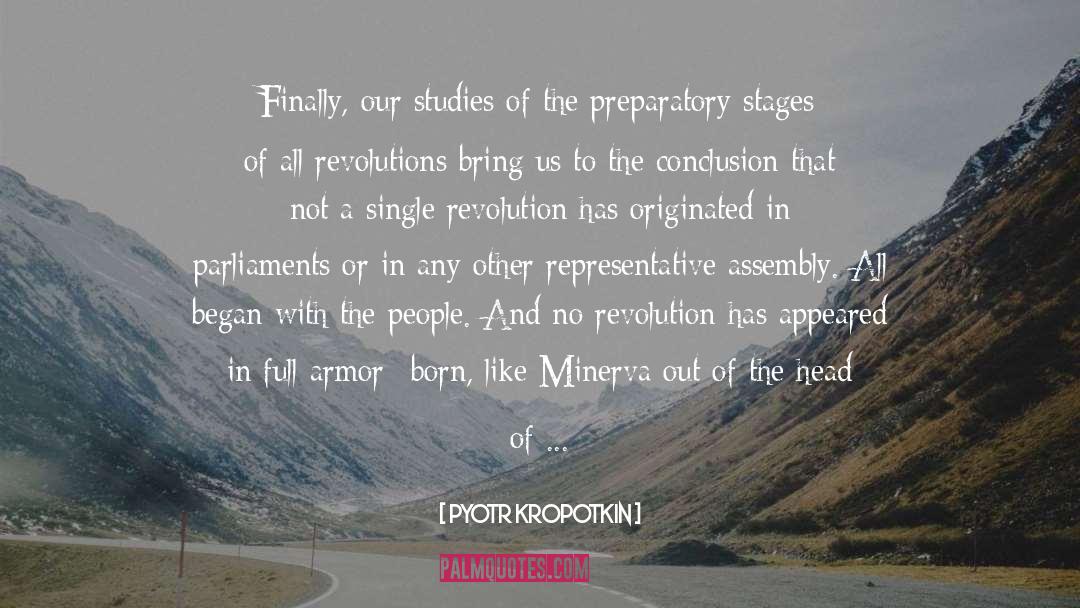
Another general favorite in our circle was Sergei Kravchinsky, who became so well know, both in England and in the United States, under the name of Stepniak. He was often called 'the Baby,' so unconcerned was he about his own security; but this carelessness about himself was merely the result of a complete absence of fear, which, after all, is often the best policy for one who is hunted by the police.

We cry shame on the feudal baron who forbade the peasant to turn a clod of earth unless he surrendered to his lord a fourth of his crop. We called those barbarous times. But if the forms have changed, the relations have remained the same, and the worker is forced, under the name of free contract, to accept feudal obligations. For, turn where he will, he can find no better conditions. Everything has become private property, and he must accept, or die or hunger.
The result of this state of things is that all our production tends in a wrong direction. Enterprise takes no thought for the needs of the community. Its only aim is to increase the gains of the speculator. Hence the constant fluctuations of trade, the periodical industrial crises, each of which throws scores of thousands of workers on the streets.

On Turgenev: He knew from Lavrov that I was an enthusiastic admirer of his writings; and one day, as we were returning in a carriage from a visit to Antokolsky's studio, he asked me what I thought of Bazarov. I frankly replied, 'Bazaraov is an admirable painting of the nihilist, but one feels that you did not love him as mush as you did your other heroes.'
'On the contrary, I loved him, intensely loved him,' Turgenev replied, with an unexpected vigor. 'When we get home I will show you my diary, in which I have noted how I wept when I had ended the novel with Bazarov's death.'
Turgenev certainly loved the intellectual aspect of Bazarov. He so identified himself with the nihilist philosophy of his hero that he even kept a diary in his name, appreciating the current events from Bazarov's point of view. But I think that he admired him more than he loved him. In a brilliant lecture on Hamlet and Don Quixote, he divided the history makers of mankind into two classes, represented by one or the other of these characters. 'Analysis first of all, and then egotism, and therefore no faith,--an egotist cannot even believe in himself:' so he characterized Hamlet. 'Therefore he is a skeptic, and never will achieve anything; while Don Quixote, who fights against windmills, and takes a barber's plate for the magic helmet of Mambrino (who of us has never made the same mistake?), is a leader of the masses, because the masses always follow those who, taking no heed of the s
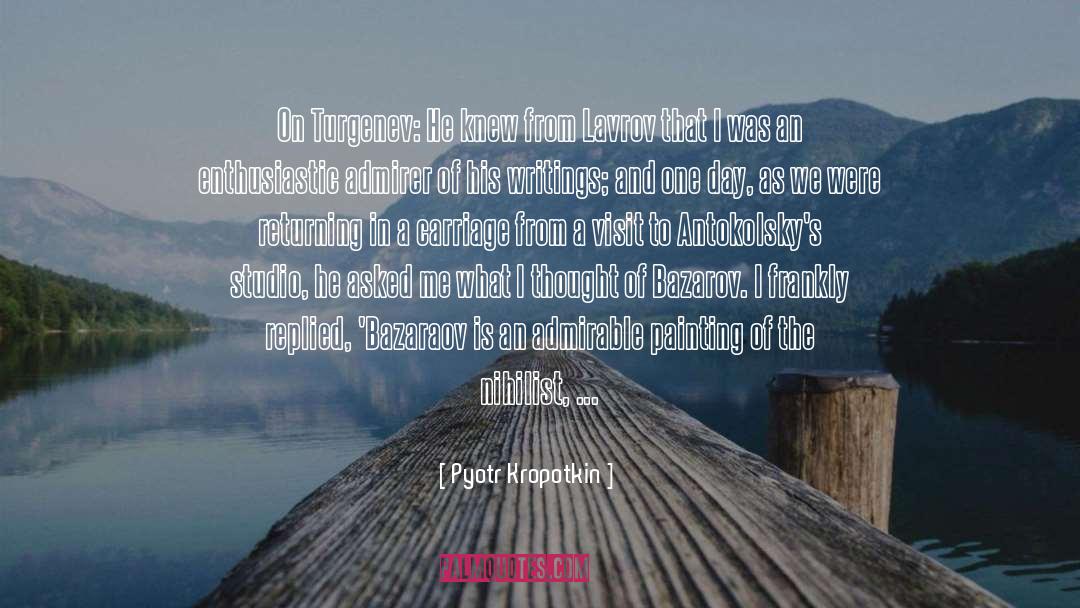
Overwork is repulsive to human nature - not work. Overwork for supplying the few with luxury - not work for the well-being of all. Work is a physiological necessity, a necessity of spending accumulated bodily energy, a necessity which is health and life itself. If so many branches of useful work are so reluctantly done now, it is merely because they mean overwork, or they are improperly organised. But we know - old Franklin knew it - that four hours of useful work every day would be more than sufficient for supplying everybody with the comfort of a moderately well-to-do middle-class house, if we all gave ourselves to productive work, and if we did not waste our productive powers as we do waste them now.
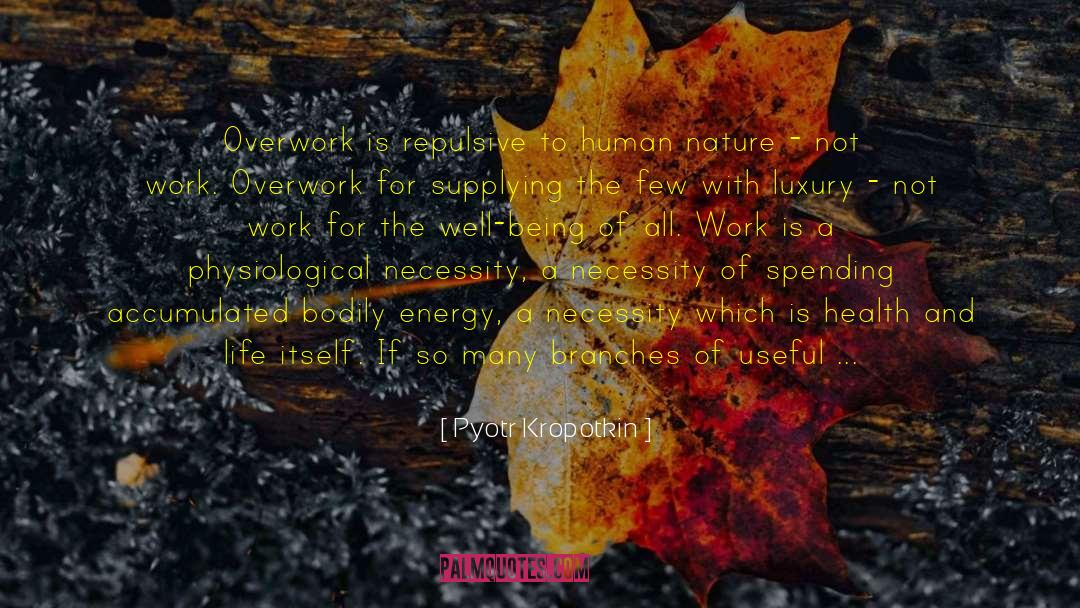
Whole columns are devoted to parliamentary debates and to political intrigues; while the vast everyday life of a nation appears only in the columns given to economic subjects, or in the pages devoted to reports of police and law cases. And when you read the newspapers, your hardly think of the incalculable number of beings - all humanity, so to say - who grow up and die, who know sorrow, who work and consume, think and create outside the few encumbering personages who have been so magnified that humanity is hidden by their shadows, enlarged by our ignorance.
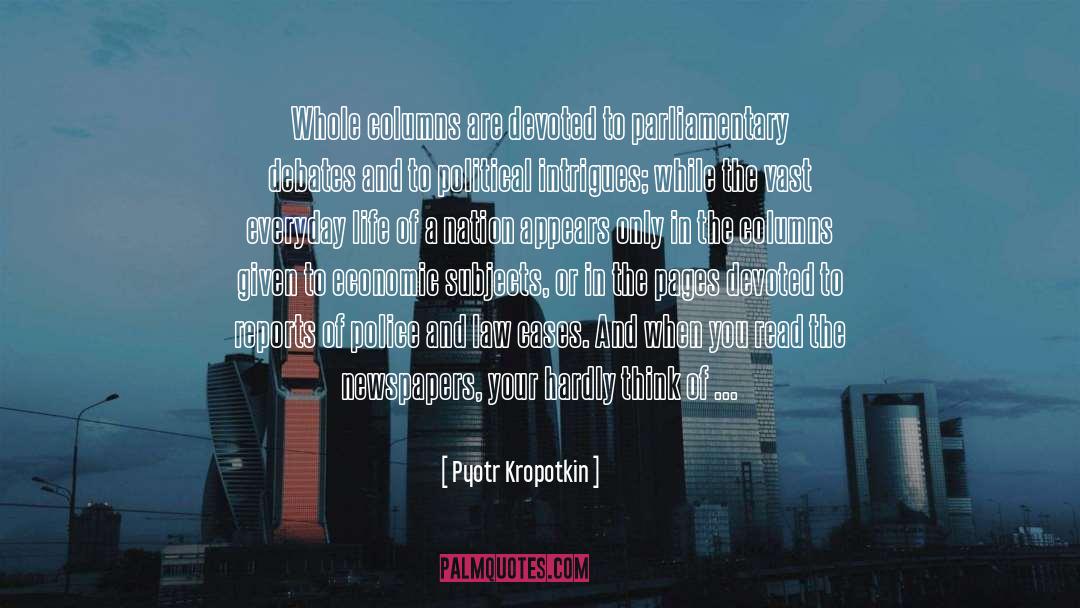
Somebody has said that dust is matter in the wrong place. The same definition applies to nine-tenths of those called lazy. They are people gone astray in a direction that does not answer to their temperament nor to their capacities. In reading the biography of great men, we are struck with the number of "idlers" among them. They were lazy so long as they had not found the right path; afterwards they became laborious to excess. Darwin, Stephenson, and many others belonged to this category of idlers.
